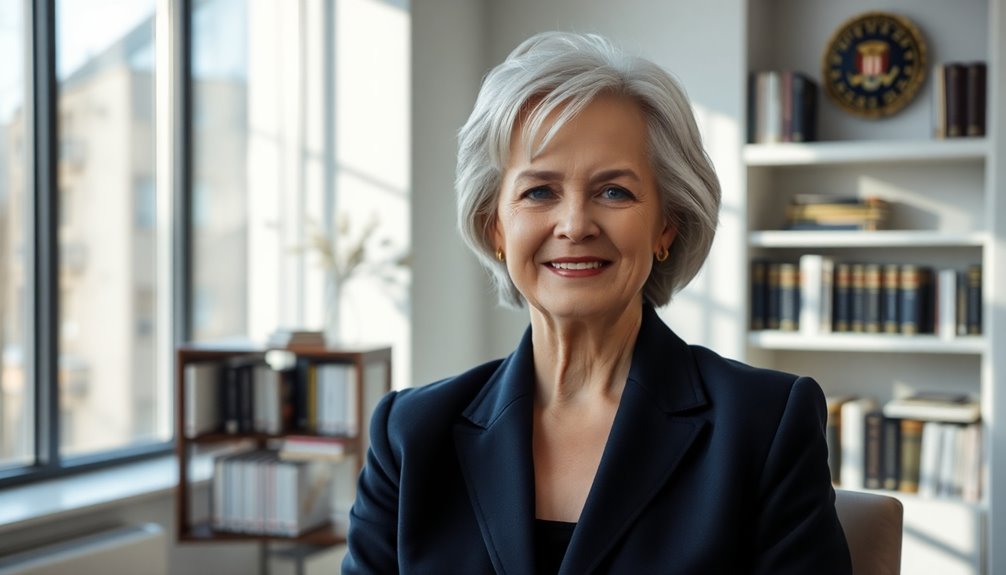I recently spoke with Candice Delong, a retired FBI profiler, about her extraordinary career and the vital role of mentorship in crime psychology. She shared fascinating stories from her notable cases, including her work on the Unabomber investigation and the Tylenol murders. Candice also discussed practical safety tips for seniors, emphasizing the importance of community engagement and self-defense. Her commitment to health and wellness shines through as she promotes balanced living and stress management. If you want to discover more about her insights and experiences, you’re in for a treat. Candice’s profound insights on crime psychology are complemented by her belief in the power of wisdom that comes with age. In her view, as she reflects on her own journey, the experiences she gathered throughout her career have been instrumental in shaping her understanding of human behavior. This sentiment echoes the thoughts of other wise figures, such as Ellen Burstyn on aging and wisdom, who highlights the importance of embracing life’s lessons to foster resilience and empathy in our communities.
Key Takeaways
- Candice Delong transitioned from healthcare to the FBI, utilizing her nursing background to understand criminal behavior and investigate high-profile cases.
- She emphasizes the importance of mentorship in crime psychology, highlighting its impact on individual growth and community development.
- Delong's podcast "KILLER PSYCHE" explores the complexities of criminal motivations and the societal fascination with true crime.
- She advocates for practical safety strategies for seniors, including home security measures and online safety practices.
- Delong maintains a health-conscious lifestyle, focusing on exercise, a balanced diet, meditation, and social connections for emotional well-being.
Candice Delong's Career Journey
Candice DeLong's career journey is nothing short of extraordinary.
I started as a Head Nurse at Chicago's Institute of Psychiatry, where my fascination with criminal behavior led to my recruitment by the FBI. Shifting from healthcare to high-stakes investigations was exhilarating. Increased smartphone usage among seniors has also changed how we communicate, including in investigative settings. Pet therapy is a growing area of interest, demonstrating the importance of emotional well-being in various contexts. The dangers of raisins for dogs highlight the critical nature of understanding health risks, even for our beloved pets, and this knowledge can be paralleled in understanding human behavior. Understanding emotional coldness is crucial for professionals working in high-stress environments like law enforcement.
I tackled high-profile cases like the Unabomber and the Tylenol murders, which shaped my expertise in criminal profiling. I also authored my memoir, "SPECIAL AGENT," sharing insights from my unique experiences.
As a trial consultant, I've helped navigate complex cases, proving that my nursing background gave me a distinct perspective. Even after retirement, I remain actively engaged in the field, dedicated to solving cold cases and mentoring others. My journey continues to inspire both me and those I work with. Access to mental health services enhances emotional well-being, which is crucial for anyone navigating challenging circumstances.
Impactful Cases in Profiling

Throughout my career, I've encountered numerous cases that profoundly impacted my understanding of criminal behavior and the human psyche. Each case taught me invaluable lessons about both the victims and the offenders.
Here are a few that stand out:
- Rescuing an 11-year-old boy from a child molester, which forged a lasting friendship.
- Investigating the Unabomber, where I explored deep into the mind of a complex criminal.
- Analyzing the Tylenol murders, highlighting the unpredictable nature of evil.
- Working on a cold case in Mexico, ultimately solving it with the victim's daughter.
- Witnessing the emotional aftermath of a case, reinforcing the importance of mentorship in law enforcement.
These experiences shape my approach to profiling and understanding humanity's darker sides.
Insights on Crime Psychology

In the domain of crime psychology, understanding the motivations behind criminal behavior is essential.
I've seen firsthand how psychopathy manifests; it's chilling to realize that some individuals can commit heinous acts without any remorse. These people often lack empathy and moral understanding, which makes them particularly dangerous.
True crime media thrives on this fascination, and I think that's why my podcast, "KILLER PSYCHE," has gained such a following. People want to grasp what drives someone to commit evil acts.
While the majority of us aren't psychopaths, the few who are can create significant chaos. By delving into their minds, we can better protect ourselves and our communities from potential threats.
Understanding crime is the first step toward prevention.
Fitness and Aging Approach

Here are some key elements I focus on:
- Regular exercise: I switched from running to home workouts and mountain walking. Incorporating quick breakfast options into my morning routine fuels my body for the day ahead. Engaging in quality mats enhances my workout experience and provides better support. Research shows that a balanced diet can significantly improve physical performance and recovery. Additionally, maintaining proper nutrition is vital for overall brain health, which enhances my focus during workouts.
- Balanced diet: My meals are about 70% plant-based, rich in nutrients.
- Meditation: It's a game changer for relaxation and sleep.
- Positive affirmations: These help me manage stress and boost my mood.
- Social connections: Engaging with loved ones keeps my spirit alive.
Incorporating high vibrational energy into my daily routine enhances my overall well-being.
Safety Tips for Seniors

Safety is a top priority for seniors, and I believe it's crucial to take proactive measures to protect ourselves.
First, always lock your doors and windows, especially at night. It's a common mistake to forget these simple precautions. Additionally, understanding the importance of ethical hacking can help in recognizing how to protect personal information online. Implementing strong passwords can significantly enhance your online security. Regularly updating your security measures is essential for maintaining a secure online presence.
Be cautious about strangers—trust your instincts. Predators often target vulnerable individuals, so don't hesitate to ask for identification if someone claims to be a service worker. Additionally, being aware of your surroundings can help you identify potential threats more effectively.
I also recommend keeping in touch with family and friends; social interactions can deter potential threats. Sharing your safety plans with loved ones can create a stronger support network.
Finally, consider taking self-defense classes; they not only teach valuable skills but also boost confidence. Additionally, utilizing technology such as best hearing aids with Bluetooth can enhance your awareness of your surroundings and improve communication in various situations.
Community Engagement Initiatives

Here are some initiatives I believe can make a difference:
- Online classes: Offering opportunities to learn new skills from the comfort of home. Engaging in mindfulness practices can also enhance self-awareness, which is beneficial for personal growth. Additionally, participating in community forums can create a supportive environment for sharing knowledge and experiences. Understanding the concept of self-regulation can help individuals manage their emotions effectively during these interactions. Exploring options for spiritual retreats can further provide tools for emotional healing and growth.
- Community newsletters: Keeping everyone informed about local events and resources.
- Social events: Creating spaces for seniors to connect and share experiences.
- Volunteer programs: Encouraging seniors to give back, which can boost self-esteem.
- Discussion forums: Allowing open dialogue to share thoughts and advice on various topics.
Engaging with others not only benefits us but also strengthens our communities. Additionally, incorporating activities like music therapy for autism can enhance emotional expression and social interaction among participants.
Let's get involved!
The Role of Mentorship

Mentorship plays an essential role in shaping not only the future of individuals but also the fabric of our communities.
I've seen firsthand how guidance and support can transform lives. As a retired FBI profiler, I'd mentors who shaped my approach to complex cases and helped me navigate challenges. They taught me the importance of resilience, critical thinking, and empathy, as well as the value of strong communication skills in building rapport with others. Establishing safe sleep environments for infants can also be an important consideration in parenting, much like the careful thought put into mentorship. Understanding narcissistic behavior can further enhance our ability to support those in need, ensuring we approach our relationships with awareness and compassion.
In turn, I endeavor to mentor others, sharing my experiences and insights. It's rewarding to witness their growth and confidence.
By fostering connections and offering support, we create a ripple effect, empowering others to achieve their potential. Establishing healthy boundaries in mentorship relationships is crucial for maintaining respect and ensuring both parties thrive.
Let's commit to being mentors in our communities, nurturing the next generation, and ensuring a brighter future for everyone.
Podcasting and True Crime Insights

Podcasting has become a powerful medium for sharing insights into the world of true crime, and I'm thrilled to be part of that conversation.
My podcast, "KILLER PSYCHE," allows me to explore the complexities of criminal psychology while engaging with a passionate audience.
Here are some key elements I focus on:
- Understanding psychopathy: Exploring the minds of those who commit heinous acts.
- Case studies: Analyzing high-profile cases and what we can learn from them.
- Expert interviews: Featuring voices from law enforcement and psychology.
- Viewer engagement: Encouraging listeners to share their thoughts and questions.
- Educational insights: Providing a deeper understanding of crime's impact on society.
It's an exhilarating journey, and I'm excited to continue exploring these themes.
Frequently Asked Questions
What Inspired You to Pursue a Career in Criminal Profiling?
I've always been fascinated by human behavior and the darker aspects of crime. My nursing background helped me understand psychology, and I felt compelled to use that knowledge to help solve cases and protect others.
How Did Your Nursing Background Influence Your Work at the FBI?
My nursing background was like a compass guiding me through chaos. It taught me empathy and observation, essential for profiling. I learned to read people's emotions like a book, revealing truths hidden beneath their surfaces.
What Hobbies Do You Enjoy Outside of Your Criminal Profiling Career?
Outside my criminal profiling career, I love hiking and exploring nature. I also enjoy reading mystery novels and practicing meditation, which helps me unwind and stay centered amidst the chaos of my past work.
How Do You Stay Updated on the Latest Crime Trends?
I keep my ear to the ground, so to speak, by diving into research, listening to podcasts, and engaging with colleagues. Staying informed helps me understand emerging crime trends and better serve my community.
What Advice Would You Give to Aspiring Crime Profilers?
If you're aspiring to be a crime profiler, I'd say stay curious, read everything, and develop strong analytical skills. Understand human behavior deeply; empathy is vital in this field. Never stop learning from every experience.
Conclusion
As I wrap up this enlightening conversation with Candice DeLong, I can't help but feel a spark of inspiration igniting within me. Her journey is like a mosaic of human experience, each piece revealing the complexities of crime and compassion. With her insights, I see a clearer path toward community safety, especially for our seniors. Candice's passion and wisdom remind us that even in the darkest corners, there's always a light guiding us toward hope and understanding.









